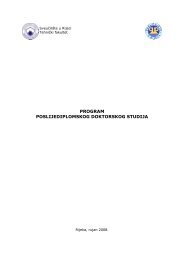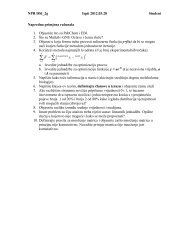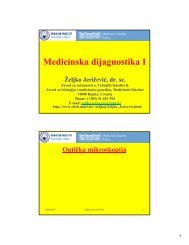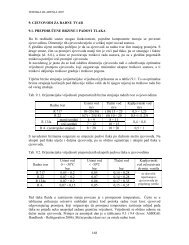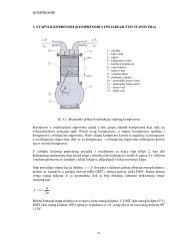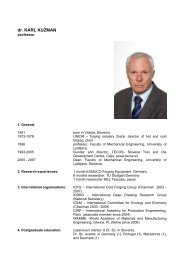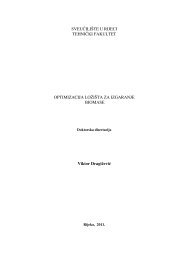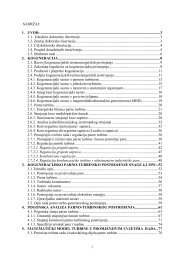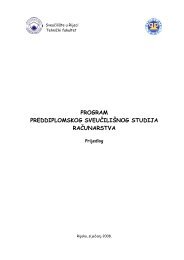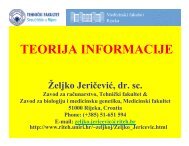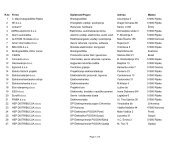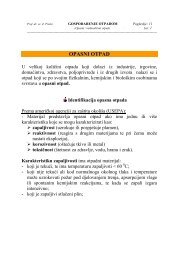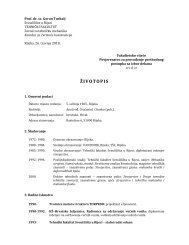universityâenterprise cooperation
universityâenterprise cooperation
universityâenterprise cooperation
You also want an ePaper? Increase the reach of your titles
YUMPU automatically turns print PDFs into web optimized ePapers that Google loves.
6. Mobility activities<br />
• Student placements (national and<br />
international);<br />
• Teachers from industry;<br />
• PhD in enterprises;<br />
• University teachers involved in<br />
enterprises’ business;<br />
• Involvement in EU networks and platforms.<br />
7. University Involvement in local and<br />
regional development<br />
• Connection and <strong>cooperation</strong> with<br />
regional development agencies and<br />
chambers of commerce;<br />
• Active involvement in regional<br />
development strategies;<br />
• Involvement in regional development<br />
projects etc.<br />
Based on contacts with university<br />
representatives (e-mail, telephone,<br />
appointment...), readiness of the university<br />
to participate in polling and collecting<br />
relevant data about UNI-ENT <strong>cooperation</strong><br />
was estimated. After preliminary contacts<br />
by the local teams of each project partner,<br />
a final list of universities to be involved<br />
in survey was determined. The selected EU<br />
universities and institutes were contacted<br />
and called to name the contact person<br />
who will be in charge of data collection<br />
and filling up of Questionnaire form on<br />
behalf of their institution. Besides the<br />
answers to a list of questions within each of<br />
Questionnaire subjects, it was also necessary<br />
to give suggestions and initiatives related<br />
to possible future activities in the field of<br />
university-enterprise <strong>cooperation</strong>.<br />
Concurrently with collection data and<br />
completion of EU good practices of<br />
university-enterprise <strong>cooperation</strong>, a<br />
detailed analysis of current situation in that<br />
field in all WBC countries were undertaken,<br />
especially those implemented in Consortium<br />
of the project. For that purpose, all the<br />
available information were used, gathered<br />
from Academic and Research networks<br />
for SEE and WBC, Ministries of Education,<br />
Ministries of Science, Ministries of Economy,<br />
The Chamber of Commerce, Agencies for SME<br />
development, National Employment Agencies<br />
and all the other stakeholders who will take<br />
part in the analysis as well as in development<br />
of the new WBC model, its assessment and<br />
adoption. All the initiatives realized in the<br />
previous, similar projects, from TEMPUS,<br />
EAR, FP6 programmes etc, were taken into<br />
consideration.<br />
After comprehensive analysis of collected<br />
EU good practices, intensive communication<br />
and interviews with academic and business<br />
community in the WBC region, as main actors<br />
in the knowledge triangle, project partners<br />
and individual experts proposed new WBC<br />
regional model of university-enterprise<br />
<strong>cooperation</strong>, described in Chapter 6 of<br />
this publication. In addition, it is planned<br />
to undertake all necessary measures and<br />
activities for its successful implementation<br />
in the region, including communication with<br />
policy makers, promotional, disseminating<br />
and raising awareness activities, networking<br />
key actors in the knowledge triangle, as well<br />
as the development of efficient and effective<br />
mechanisms for UNI-ENT <strong>cooperation</strong>. The<br />
objective is to determine and recommend<br />
the means of the efficient and sustainable<br />
<strong>cooperation</strong>, and to animate the key actors<br />
in the knowledge triangle.<br />
Detailed assessment of the proposed WBC<br />
regional model and its tuning will be carried<br />
out during the whole project period, through<br />
benchmarking process and representative<br />
case studies. It is expected that in twoyears<br />
validating and adjustment of the<br />
new regional model, at the end of the<br />
project, a reliable and sustainable model<br />
of <strong>cooperation</strong> will be obtained, leading to<br />
modernization and strengthening the role of<br />
universities in the economic development<br />
and employment growth in the WBC region.<br />
17<br />
Introduction 2



